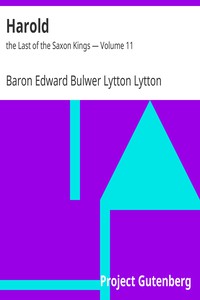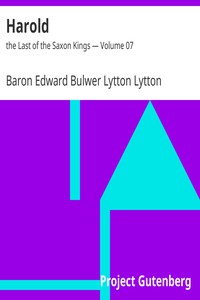Harold : the Last of the Saxon Kings — Complete by Lytton (good books for 8th graders .TXT) 📗

- Author: Lytton
Book online «Harold : the Last of the Saxon Kings — Complete by Lytton (good books for 8th graders .TXT) 📗». Author Lytton
Meanwhile the monk and the Norman knight drew near and paused at some short distance, while Haco, advancing, said briefly:
“These men I found at our outposts; they demand to speak with the King.”
“Under his standard the King will hear the Norman invader,” replied Harold; “bid them speak.”
The same sallow, mournful, ominous countenance, which Harold had before seen in the halls of Westminster, rising deathlike above the serge garb of the Benedict of Caen, now presented itself, and the monk thus spoke:
“In the name of William, Duke of the Normans in the field, Count of Rouen in the hall, Claimant of all the realms of Anglia, Scotland, and the Walloons, held under Edward his cousin, I come to thee, Harold his liege and Earl.”
“Change thy titles, or depart,” said Harold, fiercely, his brow no longer mild in its majesty, but dark as midnight. “What says William the Count of the Foreigners, to Harold, King of the Angles, and Basileus of Britain?”
“Protesting against thy assumption, I answer thee thus,” said Hugues Maigrot. “First, again he offers thee all Northumbria, up to the realm of the Scottish sub-king, if thou wilt fulfil thy vow, and cede him the crown.”
“Already have I answered,—the crown is not mine to give; and my people stand round me in arms to defend the king of their choice. What next?”
“Next, offers William to withdraw his troops from the land, if thou and thy council and chiefs will submit to the arbitrement of our most holy Pontiff, Alexander the Second, and, abide by his decision whether thou or my liege have the best right to the throne.”
“This, as Churchman,” said the Abbot of the great Convent of Peterboro’, (who, with the Abbot of Hide, had joined the march of Harold, deeming as one the cause of altar and throne), “this as Churchman, may I take leave to answer. Never yet hath it been heard in England, that the spiritual suzerain of Rome should give us our kings.”
“And,” said Harold, with a bitter smile, “the Pope hath already summoned me to this trial, as if the laws of England were kept in the rolls of the Vatican! Already, if rightly informed, the Pope hath been pleased to decide that our Saxon land is the Norman’s. I reject a judge without a right to decide; and I mock at a sentence that profanes heaven in its insult to men. Is this all?”
“One last offer yet remains,” replied the monk sternly. “This knight shall deliver its import. But ere I depart, and thou and thine are rendered up to Vengeance Divine, I speak the words of a mightier chief than William of Rouen. Thus saith his Holiness, with whom rests the power to bind and to loose, to bless and to curse: ‘Harold, the Perjurer, thou art accursed! On thee and on all who lift hand in thy cause, rests the interdict of the Church. Thou art excommunicated from the family of Christ. On thy land, with its peers and its people, yea, to the beast in the field and the bird in the air, to the seed as the sower, the harvest as the reaper, rests God’s anathema! The bull of the Vatican is in the tent of the Norman; the gonfanon of St. Peter hallows yon armies to the service of Heaven. March on, then: ye march as the Assyrian; and the angel of the Lord awaits ye on the way!’”
At these words, which for the first time apprised the English leaders that their king and kingdom were under the awful ban of excommunication, the thegns and abbots gazed on each other aghast. A visible shudder passed over the whole warlike conclave, save only three, Harold, and Gurth, and Haco.
The King himself was so moved by indignation at the insolence of the monk, and by scorn at the fulmen, which, resting not alone on his own head, presumed to blast the liberties of a nation, that he strode towards the speaker, and it is even said of him by the Norman chroniclers, that he raised his hand as if to strike the denouncer to the earth.
But Gurth interposed, and with his clear eye serenely shining with virtuous passion, he stood betwixt monk and king.
“O thou,” he exclaimed, “with the words of religion on thy lips, and the devices of fraud in thy heart, hide thy front in thy cowl, and slink back to thy master. Heard ye not, thegns and abbots, heard ye not this bad, false man offer, as if for peace, and as with the desire of justice, that the Pope should arbitrate between your King and the Norman? yet all the while the monk knew that the Pope had already predetermined the cause; and had ye fallen into the wile, ye would but have cowered under the verdict of a judgment that has presumed, even before it invoked ye to the trial, to dispose of a free people and an ancient kingdom!”
“It is true, it is true,” cried the thegns, rallying from their first superstitious terror, and, with their plain English sense of justice, revolted at the perfidy which the priest’s overtures had concealed. “We will hear no more; away with the Swikebode.” 257
The pale cheek of the monk turned yet paler, he seemed abashed by the storm of resentment he had provoked; and in some fear, perhaps, at the dark faces bent on him, he slunk behind his comrade the knight, who as yet had said nothing, but, his face concealed by his helmet, stood motionless like a steel statue. And, in fact, these two ambassadors, the one in his monk garb, the other in his iron array, were types and representatives of the two forces now brought to bear upon Harold and England—Chivalry and the Church.
At the momentary discomfiture of the Priest, now stood forth the Warrior; and, throwing back his helmet, so that the whole steel cap rested on the nape of the neck, leaving the haughty face and half-shaven head bare, Mallet de Graville thus spoke:
“The ban of the Church is against ye, warriors and chiefs of England, but for the crime of one man! Remove it from yourselves: on his single head be the curse and the consequence. Harold, called King of England—failing the two milder offers of my comrade, thus saith from the lips of his knight, (once thy guest, thy admirer, and friend,) thus saith William the Norman:—‘Though sixty thousand warriors under the banner of the Apostle wait at his beck, (and from what I see of thy force, thou canst marshal to thy guilty side scarce a third of the number,) yet will Count William lay aside all advantage, save what dwells in strong arm and good cause; and here, in presence of thy thegns, I challenge thee in his name to decide the sway of this realm by single battle. On horse and in mail, with sword and with spear, knight to knight, man to man, wilt thou meet William the Norman?’”
Before Harold could reply, and listen to the first impulse of a valour, which his worst Norman maligner, in the after day of triumphant calumny, never so lied as to impugn, the thegns themselves almost with one voice, took up the reply.
“No strife between a man and a man shall decide the liberties of thousands!”





Comments (0)